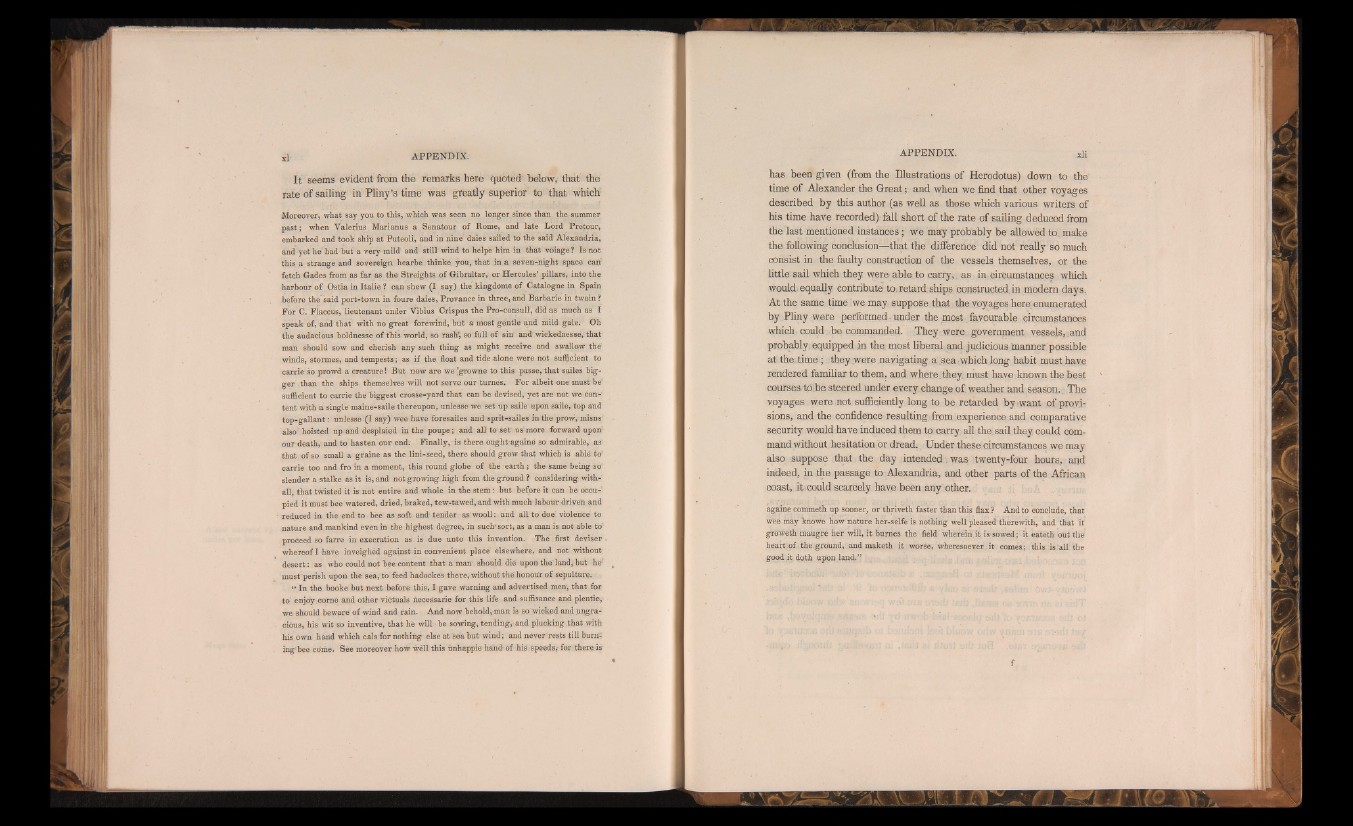
I t seems evident from the remarks here quoted below, that the
rate of sailing in Pliny’s time was greatly superior to that which’
Moreover, what say you to this, which was seen no longer since than the summer
past; when Valerius Marianus a Senatour of Rome, and late Lord Pretour,
embarked and took ship at Puteoli, and in nine daies sailed to the said Alexandria,
and yet he had but a very mild and still wind to helpe him in that vôiage? Is not
this a strange and sovereign hearbe thinke you, that in a seven-night space can
fetch Gades from as far as the Streights of Gibraltar, or Hercules’ pillars, into the
harbour of Ostia in Italie ? can shew (I say) the kingdome of Catalogne in Spain
before the said port-town in foure daies, Provance in three, and Barbarie in twain?
For C. Fiaccus, lieutenant under Yibius Crispus the Pro-consull, did as much as I
speak of, and that with no great forëwind, but a most gentle and mild. gale. Oh
the audacious boldnesse of this world, so rash’, so’full of sin’ and wickednessé, that
man should sow and cherish any such thing as might receive and swallow the
winds, stormes, and tempests; as if the float and tide alone were not sufficient to
carrie so prowd a creature! But now are we 'growne to this passe, that sailes bigger
than the ships themselves will not’serve our turnes. For albeit one must be-'
sufficient to carrie the biggest crosse-yard that can be devised, yet are'not we con--
tent with a single maine-saile thereupon, unlesse wè set up saile upon sâile, top and
top-gallant : unlesse (I say) wee have foresailes and sprit-sailes in the prow; misns;
also hoisted up and desplaied in the poupe ; and all to sët us more forward upoir
our death, and to hasten our end. Finally, is there ought againe so admirable,- as
that of so small a graine as the lini-seed, there should grow that which is able to'
carrie too and fro in a moment, this round globe of the ; earth ; the samé being so'
slènder a stalke as it is, and not growing high from the ground ? considering with-
all, that twisted it is not entire arid whole in the stein : but before it can be occupied
it must bee watered, dried, braked, tew-tawed, and with much labour driven and
reduced in the end to beé as soft and tender as wooll: and all to doe' violence to
nature and mankind even in the highest degree, in such'sort, as a man is not able to1
proceed so farre rin execration as is due unto this invention. The first deviser
whereof I have inveighèd against in conveniént placé élsewherè, and not without
desert: as who could not beecontent that'a man should die upon the land; but he*
must perish upori the sea, to feed hadockes there, without the honour of sepulture.
“ In the booke but next before this, I gave Earning and advertised men’, that for
to enjoy-.corne and other victuals necessarie for this life and suffisance and plentiey
we should beware of wind and fain. And now behold, man is so'wicked and ungracious,
his wit so inventive, that he will be sowing, tending, and plucking that with
his own hand which cals for nothing else at sea but wind ; and never rests till burn;
mg’bee come. Sèe moreover how wéll this iinhappie hand- of his' speeds; for there ishas
been given (from the Illustrations of Herodotus) down to the
time of Alexander the Great ; and when we find that other voyages
described by this author (as well as those which various writers of
his time have recorded) fall short of the rate of sailing deduced from
the last mentioned instances ; We may probably be allowed to. make
the following conclusion—that the difference did not really so much
consist in the faulty construction of the vessels themselves, or the
' little sail which:they were able to carry,, as in Circumstances which
would) equally contribute' to, retard ships constructed in modern days.
At the same time we may su p p o se lh a t the voyages here enumerated
by Pliny were performed : under the most favourable circumstances
which, could..be commanded. They were government vessels, ,and
probably. equipped in the, most liberal, and judicious m anner possible
at the, time ; they we re navigating aise a .which long habit must have
rendered familiar tq them, and where they, must have known the .Best
coursés to,be steered under every change of weather and Season.: The
voyages were not sufficiently long to b e , retarded by wan t of provisions,
and the confidence resulting from experience.and comparative
security would have induced them to carry all the. sail they could command
without hesitation or dread; Under these circumstances we may
also suppose that the day intended ; was twenty-four hours, and
indeed, in the passage to Alexandria, and other parts of the African
coast, it, could scarcely have been any other.
againe commeth up sooner, orthriveth faster than this flax ? And to conclude, that
wee may hriowe how nature her-selfe is nothing well pleased therewith, and that it
groweth maugré her will, it buroes the field wherein it is sowed; it eatëth out the
hearVpf,the.ground, andmaketh it worse, wheresoev.er.it comes; this is all the
good it doth upon land.”